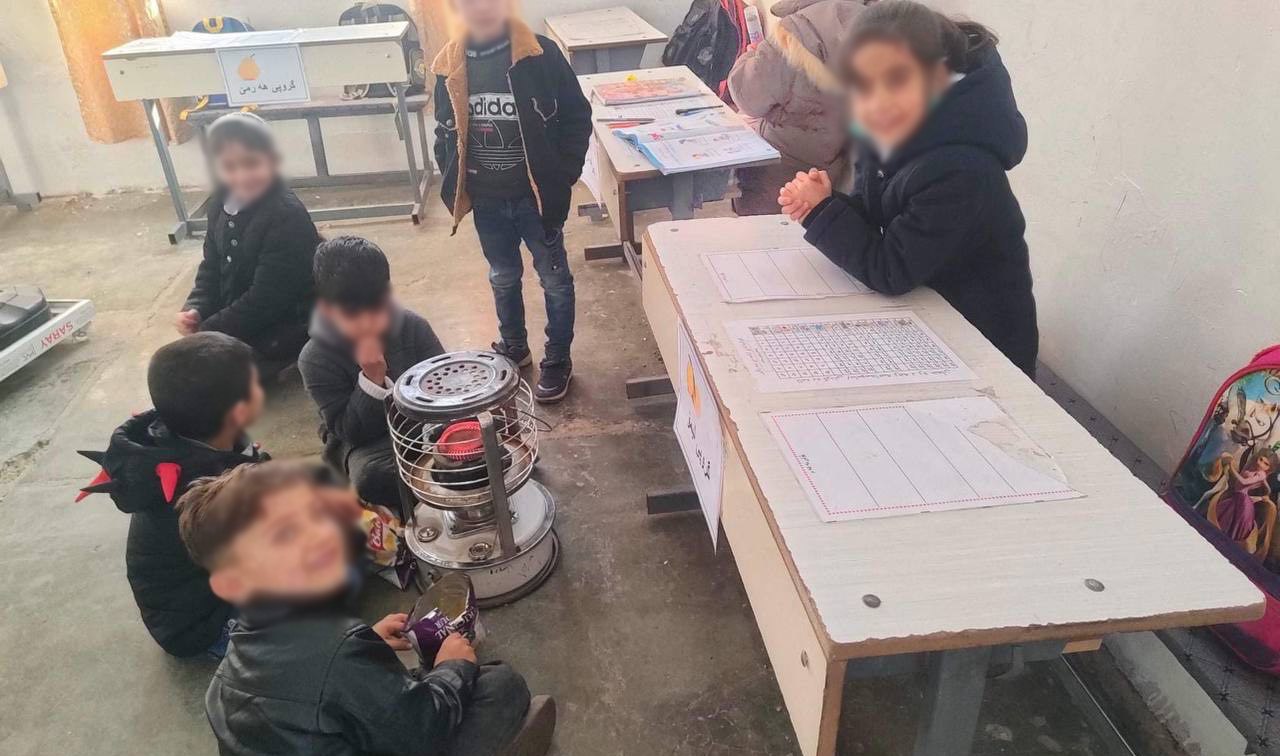Students in classrooms of Kirkuk public schools are suffering as their schools are not provided with adequate heaters, kerosene, and electricity during freezing winter as the temperatures are getting lower.
The Kirkuk General Directorate of Education has allocated one kerosene heater for each school, which is usually used at the principal or teachers’ office, not for the students at the classes. However, some schools have not received any quantity of state-subsidized kerosene for two years.
“The classrooms are very cold, the students, especially the first and second grades, are cold. There are no heaters or kerosene,” said Reza Ahmad, the principal of Amed School in Daquq – 44 km south of Kirkuk.
"We (teachers) are even collecting money among ourselves to buy kerosene," he said.
We (teachers) are even collecting money among ourselves to buy kerosene
The problem comes as the temperature is down in the last weeks and classrooms are cold for primary school students.
There are six classrooms in Amed Primary public school and they have been given only one heater for the administration room. The teachers occasionally take the heater into classrooms to prevent children from getting sick and having problems, Reza Ahmad said.
A photo taken by KirkukNow reporter in one of the schools in Daquq, shows a number of primary school students surrounding a kerosene heater provided by the school administration.
"They were very cold and couldn't go on in this way so we decided to bring them the heater of the administration room at least until the room warmed up," a teacher said.
This problem has affected most of the public schools in Kirkuk. In some schools, each week a teacher takes a 20-liter jerry cane of kerosene from his home to school since local administration have failed to provide schools with kerosene ahead of winter and the cold weather.
Located 238 kilometers north of Baghdad, the oil-rich city of Kirkuk is an ethnically mixed province for 1.7 million Kurds, Arabs, and Turkmen, Muslims, Christians and Kaka'is. It has long been at the center of disputes between Baghdad and the Erbil.
The lack of kerosene for people of Kirkuk including schools comes at a time that crude oil exports from the five oil fields of Kirkuk through pipelines and tanks in 2022 amounted to almost 30 million barrels generating about three billion American dollars for the national budget while public services are very poor, in particular electricity, water, public roads, healthcare and education sectors.
KirkukNow asked several primary school students, all of whom said that there are days when they cannot study properly because of the cold weather.
“When we come to school in the morning, we are very cold and we don't get warm,” several students in the grades one and two told KirkukNow.
School principals blame the local administration for not providing schools with adequate heaters and kerosene.
"They have informed us that they will give us kerosene in the near future, but this process should have been done when work starts. We don't need kerosene and heaters after one or two month," said Nizam Najmadin, principal of Shorija school in central Kirkuk.
"This year we have spent 90,000 to buy kerosene for the administration's heater," he added.
Video: Kirkukis queuing to receive state-subsidized kerosene, last October.
In the Iraqi Kurdistan Region IKR, there are heaters in most classrooms and the government provides public schools with kerosene, and on most days the heaters are lit. Private schools have private generators and use air conditioners.
"The kerosene has not been distributed for two years. We have addressed Oil Products Distribution in Kirkuk several times for kerosene. The last time (Thursday, December 12), they said they would provide 200 liters (barrel) for each school," said Juma Assaf, a supervisor at Kirkuk education.
The failure to distribute kerosene to schools on time has led some armed groups to distribute kerosene to certain Turkmen and Arab schools in Daquq district.
"We are aware that Hashdi Shaabi (Popular Mobilization Forces PMF) took kerosene to several schools of Turkmens and Arabs last week," Assaf added.
There are 1,700 primary, secondary and high schools in Kirkuk province, divided into Arabic, Kurdish, Turkmen and Syriac departments.
Saman Majid, the deputy director general of education in Kirkuk, said he in person have visited the Kirkuk Oil products office.
“They say will give kerosene to schools at the same price they sell to the people of Kirkuk schools. Each barrel is for 60,000 Dinars (USD40), plus transportations it will be 80,000,” Majid said.
"Despite our agreement, the kerosene has not been distributed yet and we have been waiting for two years," he added.
“The Ministry of Education has not provided us with heaters. If you ask for 1,000 heaters, they will send you 500. We have been using the old heaters for two years and have not received new ones.”
The Ministry of Education has not provided us with heaters
Iraq’s education infrastructure is in ruins in many parts of the country; one in every two schools is damaged and needs rehabilitation, says a report by UNICEF about education in Iraq.
A number of schools operate in multiple shifts in an attempt to accommodate as many students as possible, squeezing the half-day learning time that children have.
A source in Kirkuk kerosene products anonymously told KirkukNow that schools can now receive their kerosene quota, the amount of 200 liters for each school.
"The process is very slow; routines may be an obstacle to receiving their kerosene quota. Besides, it is the administration, not the classes. That is the decision of the Ministry of Oil,” he affirmed.
"They must bring a letter from the education department, have their names on the list, then we will assign them a gas station and they must find a vehicle and go to pick it up."





